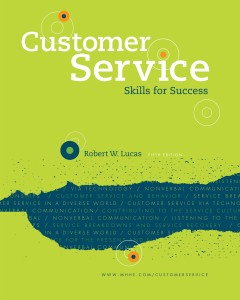Elements of a Service Culture
A positive service culture is crucial for organizations that want to remain competitive and build brand and customer loyalty.
Many elements define a successful service organization. Some of the more common are:
Service philosophy or mission: The direction or vision of an organization that supports day-to-day interactions with the customer.
Employee roles and expectations: The specific communications or measures that indicate what is expected of employees in customer interactions and that define how employee service performance will be evaluated.
Delivery systems: The way an organization delivers its products and services.
Policies and procedures: The guidelines that establish how various situations or transactions will be handled.
Products and services: The materials, products, and services that are state of the art, are competitively priced, and meet the needs of customers.
Management support: The availability of management to answer questions and assist frontline employees in customer interactions when necessary. Also, the level of management involvement and enthusiasm in coaching and mentoring professional development of employees is crucial in creating a positive service culture.
Motivators and rewards: Monetary rewards, material items, or feedback that prompts employees to continue to deliver service and perform at a high level of effectiveness and efficiency.
Training: Instruction or information provided through a variety of techniques that teach knowledge or skills, or attempt to influence employee attitude toward excellent service delivery.
Source: Customer Service Skills for Success by Robert W. Lucas
About Robert C. Lucas
Bob Lucas has been a trainer, presenter, customer service expert, and adult educator for over four decades. He has written hundreds of articles on training, writing, self-publishing, and workplace learning skills and issues. He is also an award-winning author who has written thirty-seven books on topics such as, writing, relationships, customer service, brain-based learning, and creative training strategies, interpersonal communication, diversity, and supervisory skills. Additionally, he has contributed articles, chapters, and activities to eighteen compilation books. Bob retired from the U.S. Marine Corps in 1991 after twenty-two years of active and reserve service.
Make Money Writing Books: Proven Profit Making Strategies for Authors by Robert W. Lucas at Amazon.com.
The key to successfully making money as an author and/or self-publisher is to brand yourself and your company and to make yourself and your book(s) a household name. Part of this is face-to-face interaction with people at trade shows, library events, book readings, book store signings, blogging or guest blogging on a topic related to their book(s). Another strategy involves writing articles and other materials that show up online and are found when people search for a given topic related to a topic about which the author has written.
If you need help building an author platform, branding yourself and your book(s) or generating recognition for what you do, Make Money Writing Books will help. Bob’s popular book addresses a multitude of ideas and strategies that you can use to help sell more books and create residual and passive income streams. The tips outlined in the book are focused to help authors but apply to virtually any professional trying to increase personal and product recognition and visibility.
